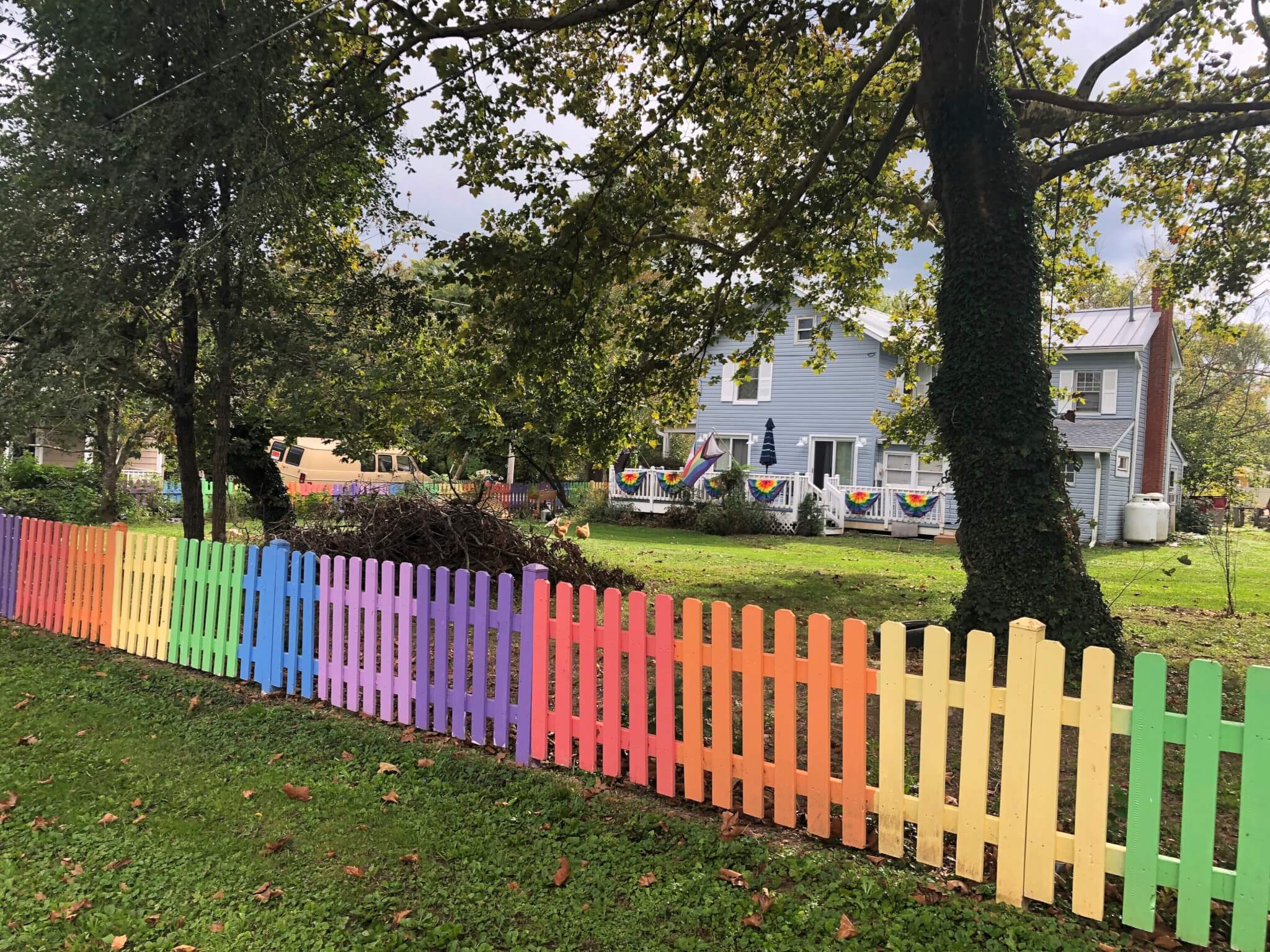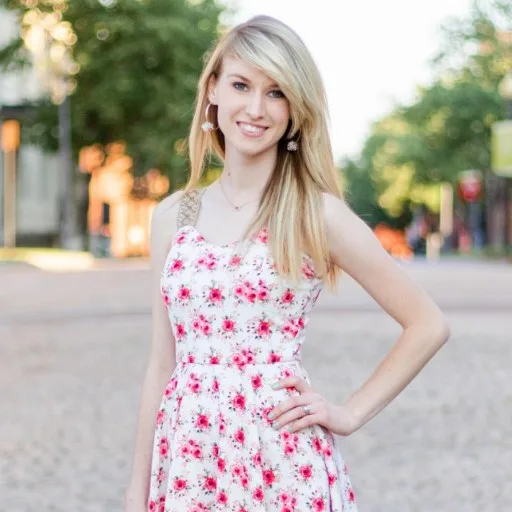
A home along Pennsylvania Avenue, in Lovettsville, Va., displays a fence painted in the colors of the gay-pride rainbow flag, on Oct. 4, 2021. About 20 neighbors showed up to help the owners, Kris Consaul and Sheryl Frye, when they decided on the paint scheme in 2020 as a way to support the town's LGBT youth when young people were isolated at home in the pandemic. The fence has become a showpiece, delighting many neighbors. But in the 2020 campaign, a pro-Trump parade of vehicles diverted off the main street to blast car horns at their property. (AP Photo/Cal Woodward)
How would you react if a teacher revealed your sexual orientation to your parents before you did?
You’ve known for a while. Chances are, you might’ve told a friend or two, or maybe a trusted teacher.
Positive that this is who you are — and that you know who you love — you’re finally ready to tell your parents. You’ve replayed over (and over) exactly how you’re going to tell them. You’ve wondered how they’re going to respond, and questioned if things will be different after the revelation.
Best to go ahead and let them know, right? Besides, this is your life, and you’re the one who ultimately decides what goes on in it — especially today. You’ve got everything planned just right; you’ve found the best way to come out to your parents. This is your moment.
You close your eyes, take a deep breath, open the front door, and…
There sits a certain commonwealth governor in his signature sweater vest at your family dinner table, talking with your dear parents. Oh, and he’s just told them that he thinks you’re gay.
Thankfully, that’s a made-up scenario — at least, for now. However, it’s not too far off from what Gov. Glenn Youngkin, a Republican, recently suggested.
A Teacher’s Role?
Should teachers be obligated to tell a student’s parents if they suspect a child may have a sexual orientation other than straight? During an interview with Sinclair-owned, Arlington-based WJLA, Youngkin weighed in with his opinion on “informing parents with most important decisions about their children.”
“Parents should be at the forefront of all of these discussions. And I firmly believe that teachers and schools have an obligation to make sure that parents are well informed about what’s happening in their kids’ lives,” Youngkin said. “And one of the things we learned last year during the campaign is that parents were tired of being pushed to the background in their child’s education.”
The news outlet that broke the story on Youngkin’s comments noted that in some Virginia school districts, like Fairfax County and Loudoun County, teachers can’t divulge certain sensitive information.
In Fairfax, Regulation 2603 provides gender-expansive and transgender students with an equitable, safe, and supportive school environment. That includes a teacher-based nondisclosure of a student’s gender-expansive or transgender status, legal name, or sex assigned at birth, to other school personnel who do not have a need to know. The regulation voids if a student authorizes the disclosure, or if the disclosure is legally required.
In Loudoun, Regulation 8040 notes that teachers must follow legal standards of confidentiality regarding a student’s “gender identity, transgender status, legal name, or sex assigned at birth,” and that “staff must support student privacy and safety and not disclose a student’s gender identity or transgender status to other students or other parents.”
The issue of information isn’t unique to Virginia. In April, Education Week, an independent news organization focused on covering issues about K-12 education, questioned whether or not teachers are — or could soon be — obligated to tell parents if they suspect a student may be transgender. The question stemmed from potential violations of the US Constitution’s 14th Amendment, which gives parents the right to direct their child’s upbringing, health, and welfare, and of multiple state constitutions.
Virginia Reacts
Several Virginians expressed strong opinions about the possibility of teachers becoming responsible for such a personal revelation.
Former Del. Jay Jones took to Twitter, posting: “Imagine telling people you follow the teachings of Jesus — treating people with love and compassion — and then inducing immeasurable trauma on a child by forcing teachers to out them to their entire community. [Youngkin’s] idea of faith is hatred and persecution of children.”
Sen. Louise Lucas also went on Twitter, posting: “BREAKING: The Youngkin administration is now attempting to ban the mention of homosexuality in all Virginia schools- using an outdated and unconstitutional section of code to define “sexually explicit content” to bypass the General Assembly.”
Following, Lucas posted a screen shot of the Code of Virginia, noting: “This section of code lists homosexuality [separately] as if being gay was somehow a sexual act.”
The question came on the heels of Senate Bill (SB) 656, which passed the Virginia General Assembly earlier this year. The bill, which Youngkin signed, required that parents receive a notification if instructional materials contained any “sexually explicit content,” but fell short of defining what, exactly, that entailed.
Under current Virginia law, the definition for sexual conduct includes “masturbation, homosexuality, sexual intercourse, or physical contact in an act of apparent sexual stimulation or gratification.”
The Pride Liberation Project, a coalition of more than 600 queer youth and allies who are current public school students in Virginia, wrote a letter addressed to state education leaders, expressing their concerns with the potentially broad scope of the law.
“In effect, SB 656 can potentially be interpreted to define all references to people in same-sex relationships as inherently sexual. We are writing to you to ask that the Department of Education develop guidelines that explicitly state that instruction about LGBTQIA+ people is not inherently sexual,” the letter read in part.
The students noted that developing guidelines that failed to specify that LGBTQIA+ topics were not inherently sexual would “have a chilling effect” on education.
The letter stated: “Erasing Queer people from our classes would lead to fictionalized and over-simplified instruction, given the immense contributions that LGBTQIA+ people have made to our state and county. Moreover, every student, including LGBTQIA+ youth, deserves to be accurately represented in our curriculum. Representation is associated with stronger academic performance, improved mental health, and social prosperity.”
Letter writers also expressed concerns over queer students’ heightened vulnerability to suicide and the mental health crisis.
Support Our Cause
Thank you for taking the time to read our work. Before you go, we hope you'll consider supporting our values-driven journalism, which has always strived to make clear what's really at stake for Virginians and our future.
Since day one, our goal here at Dogwood has always been to empower people across the commonwealth with fact-based news and information. We believe that when people are armed with knowledge about what's happening in their local, state, and federal governments—including who is working on their behalf and who is actively trying to block efforts aimed at improving the daily lives of Virginia families—they will be inspired to become civically engaged.


VIDEO: Your support matters!
Your support matters! Donate today. @vadogwoodnews Your support matters! Visit our link in bio to donate today. #virginianews #virginia #community...

Op-Ed: Virginia’s new Democratic majorities pass key bills to improve your lives, but will Youngkin sign them?
The 2024 Virginia General Assembly regular session has wrapped up. It was a peculiar session from the outset, with Democratic majorities in the...

Op-Ed: Why Virginia Needs A Constitutional Amendment Protecting Reproductive Freedom
Virginia’s recent election season in 2023 drew in eyes from all over the country. Reproductive freedom was on the line and Virginia remained the...

From the state rock to the state flower, here’s how Virginia got its symbols
Have you ever wondered why the Dogwood is the state flower? Or how the cardinal became the state bird? We’re here to answer those questions and more...

VIDEO: Second-gentleman Douglas Emhoff gives speech on reproductive freedom
Second gentleman, Douglas Emhoff touched on reproductive freedom not only being a woman's issue but "an everyone's issue" during the Biden-Harris...

Glenn Youngkin and the terrible, horrible, no good, very bad night
Election Day 2023 has come and gone, and while there are votes to be counted, one thing is perfectly clear: Virginians unequivocally rejected Gov....





